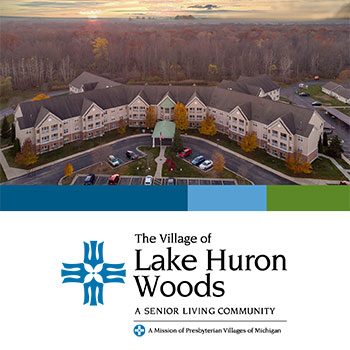Congratulations to Erica Thrash-Sall, Executive Director of McFarlan Villages, who has been selected by The Robert Wood Johnson Foundation and LeadingAge for the 2021 Robert Wood Johnson Foundation (RWFJ) Award for Health Equity.
LeadingAge has awarded the 2021 Robert Wood Johnson Foundation (RWFJ) Award for Health Equity to Erica Thrash-Sall, executive director of McFarlan Villages Corporation, a Presbyterian Villages of Michigan community. The award will be presented at the LeadingAge Annual Meeting and EXPO, which takes place Oct. 24-27, 2021, in Atlanta, GA.
Launched in 2015, the RWJF Award for Health Equity celebrates individuals who have changed systems and policies at a local level to increase the chance that everyone has a fair and just opportunity to live the healthiest life possible.
McFarlan Villages, a LeadingAge member based in Flint, MI, has two campuses: an affordable senior housing community that is home to 300 older adults with low incomes, and a 29-unit assisted living community for women.
Since her arrival at McFarlan Villages in 2016, Thrash-Sall has worked hard to build relationships in the greater Flint community. Those relationships have been instrumental in helping older residents of McFarlan Villages and its surrounding community gain access to an array of health and wellness resources, regardless of their ability to pay. In the process, McFarlan Villages has become a hub of supports for older adults, especially those who are aging in poverty and have significant physical and behavioral health needs.
“Older adults in the Flint community face a myriad of issues from poverty, the devastating water crisis, excessive community blight, and high crime rates,” according to Lynn Alexander, a senior vice president at Presbyterian Villages of Michigan who nominated Thrash-Sall for the RWJF award. “Any one of these issues alone could induce trauma, but all of these together makes trauma an absolute norm.”
Over 50% of McFarlan Villages residents live at or below the poverty line. Three quarters (75%) are people of color. Before the pandemic began, most residents (83%) reported having a health concern, 50% reported feeling depressed and isolated, and 58% reported having major financial concerns. A third (34%) of residents report having a diagnosis of diabetes and more than three-quarters (79%) report having hypertension.
These statistics prompted Thrash-Sall and her team to focus on trying to help older adults prevent disease or manage their chronic health conditions so that they could live independently for as long as possible. McFarlan Villages now employs a full-time wellness coordinator who provides holistic activities and engages residents in the greater community. A full-time community health worker helps residents access supportive services through a network of partners, including local health and service providers.
For the past four years, McFarlan Villages has collaborated with Hamilton Community Health Network, a local Federally Qualified Health Center (FQHC), to establish a primary health care center on McFarlan’s affordable housing campus. The center, which opened in August, serves McFarlan Villages residents and older adults who live in the greater Flint community, including residents of two nearby affordable senior housing communities.
Thrash-Sall and the McFarlan board of directors decided to work with a FQHC because its model of care is designed to reduce health disparities. FQHCs employ a diverse staff that is trained to work with vulnerable populations, a key need among older adults who face barriers that are deeply rooted in poverty and racism.
The onsite team at McFarlan Villages will supplement the work of the new health center by providing wellness programming and other supports to help health center clients manage their health conditions on a daily basis.
“There will be a culture of health and wellness in the building to support both residents and older adults from the greater community,” wrote Alexander.









